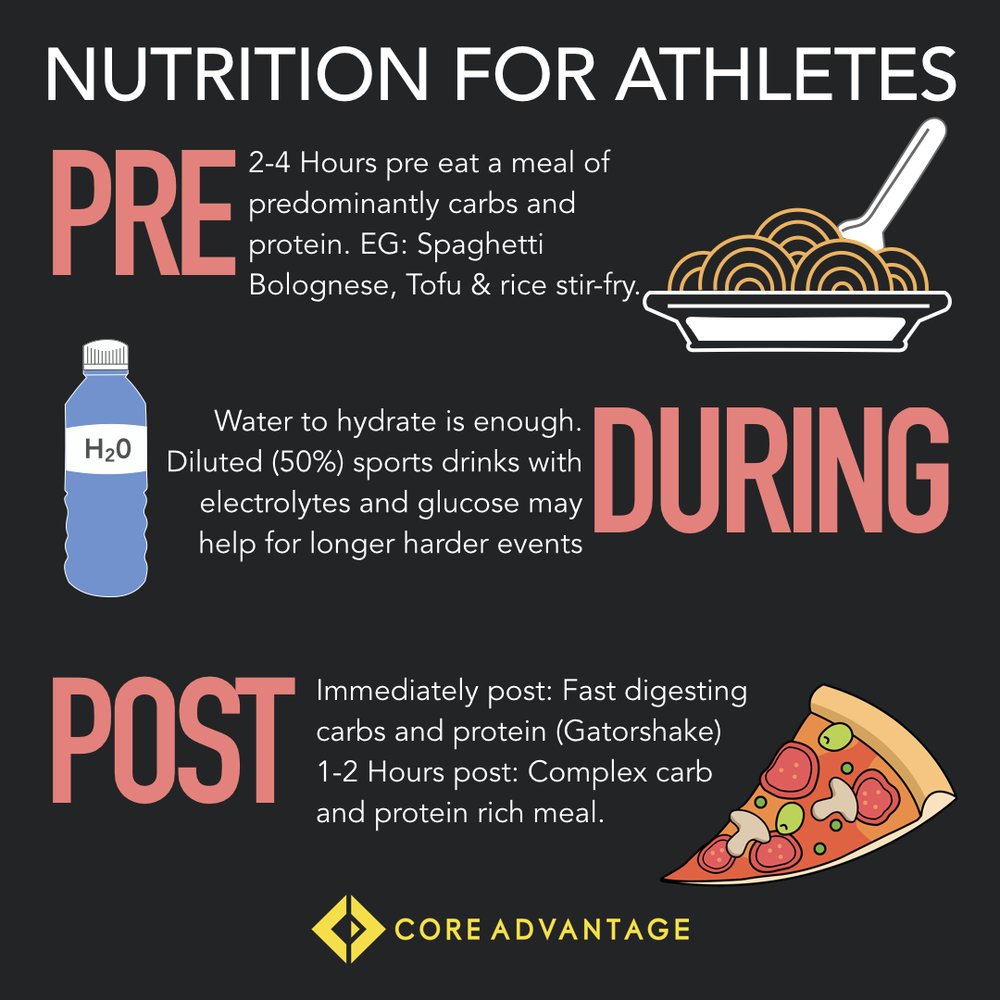What to Eat on Game Day
Getting proper nutrition before a game is crucial to maximize energy and performance, but when coupled with pre-game nerves, it can be difficult to know what and when to eat, for fear of it hindering the game-time experience.
Stress and Digestion:
As stress and anxiety levels ramp up in anticipation for a game, the brain activates the sympathetic nervous system, which is responsible for the body's fight-or-flight response. Consequently, the hypothalamus sends a message to the adrenal glands, releasing adrenaline, serotonin, and cortisol hormones into the intestinal tract.
Under stressful conditions, non-immediate survival functions like digestion are conserved. This then leads to nausea and stomach aches. Symptoms, namely diarrhea, follow as compensatory responses to relax the body. To combat these “nervous poops,” it is crucial to find a balanced diet, listen to your body, and do your best to decompress.
The Night Before:
The night before a game, it is recommended to "carbo load," or prioritize high levels of carbohydrate consumption, as this will maximize glycogen storage for high-level exertion. This is especially crucial for one’s on-field endurance. Stick to consuming familiar foods and avoid excessively fatty, salty, or oily foods, the latter of which may upset the stomach. Recommended foods include:
Whole-grain pasta
Rice
Potatoes
Lean meat
Starchy vegetables
Whole grain bread
Bananas
Peanut butter
Granola bars
Trail mix
Before the Game:
Food consumed hours preceding a game share a similar pattern to the night before. Again, these prioritize high levels of whole-grain carbs, lean protein, and healthy fats. Getting proper hydration is extremely important; aim for 500-700 mL of fluid around 4 hours prior. Recommended foods include:
Whole-grain pasta
Oats
Broccoli
Sweet potatoes
Bananas
Whole-grain bread
Peanut butter
Granola bars
Trail mix
Fruit
During the Game:
Small snacks such as crackers and fruits should be used to replenish energy throughout the game. Aim for 150-250 mL of fluids regularly, not just based on thirst. Sports drinks like gatorade are beneficial for greater fluid retention and increase electrolytes absorption. Juice and soda should be avoided, as their high concentrations of sugar may upset the stomach
After the Game:
It is optimal to refuel within 60 minutes of a game by eating a quick carbohydrate-dense snack. This can be any of the aforementioned foods listed. A well-balanced meal with protein, carbs, and healthy fats is the desired post-game goal.
Sources:
Sentongo, Timothy. “What Young Athletes Should Eat before and after the Game.” UChicago Medicine, 1 Mar. 2023, https://www.uchicagomedicine.org/forefront/pediatrics-articles/what-young-athletes-should-eat-before-and-after-the-game. Accessed 19 Feb. 2024.
Game Day Fueling Plan for Athletes. https://www.nationwidechildrens.org/specialties/sports-medicine/sports-medicine-articles/game-day-fueling-plan-for-athletes. Accessed 19 Feb. 2024.
“How Stress Affects Digestion—And What You Can Do About It.” Henry Ford Health, https://www.henryford.com/blog/2021/07/how-stress-affects-digestion. Accessed 19 Feb. 2024.
Clinic, Cleveland. “Yes, Anxiety Poops Are Totally a Thing — Here’s How To Find Relief.” Cleveland Clinic, 23 Feb. 2023, https://health.clevelandclinic.org/how-to-stop-nervous-poops. Accessed 19 Feb. 2024.
Ern, Diane Ashley Seto. “Should You Carb Load for Sports?” Gleneagles Hospital, https://www.gleneagles.com.sg/health-plus/article/carb-load-for-sports#:~:text=This%20is%20because%20such%20strenuous,delay%20the%20onset%20of%20fatigue. Accessed 19 Feb. 2024.


